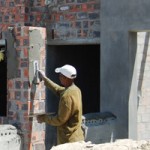 With a residential property development boom being predicted in Cape Town (according a recent article in a leading Cape newspaper), one is made aware of the extensive building that is taking place in many of the surrounding areas, where old buildings are being demolished to subdivide properties and build new units or substantial alterations are being made to existing buildings, says Lanice Steward, managing director of Knight Frank Residential SA.
With a residential property development boom being predicted in Cape Town (according a recent article in a leading Cape newspaper), one is made aware of the extensive building that is taking place in many of the surrounding areas, where old buildings are being demolished to subdivide properties and build new units or substantial alterations are being made to existing buildings, says Lanice Steward, managing director of Knight Frank Residential SA.
If a property is purchased from a developer the building may be covered against structural defects for up to five years from the date of occupation, as part of the National Home Building Registration Council’s warranty scheme, but this is dependent on the builder as well as all of his sub-contractors being registered with the NHBRC. In addition to the builders being registered, the building itself must be formally enrolled with the NHBRC. The builder can be fined up to R25 000 per unit, according to section 14(1) of the Housing Consumers Protection Measures Act if the unit is not formally enrolled.
“It is essential to ensure that all the bodies with which you contract to do the job are registered,” said Steward. “For example, if you are using a property developer who subcontracts to a construction company, both of these companies have to be registered as a homebuilder in terms of the Housing Consumer Protection Measures Act, which states: “No person shall a) carry on the business of a home builder; or b) receive any consideration in terms of any agreement with a housing consumer in respect of the sale or construction of a home, unless that person is a registered home builder.””
The NHBRC Warranty Scheme’s objective is to rectify certain deficiencies relating to design, workmanship and material defects and gives consumers protection against builders who deliver substandard work. The warranty covers the structure, floor slabs and roof up to a maximum amount of R500 000.
“Often those renovating or building might be tempted to use a “bakkie builder” but it must be remembered that those sort of builders are more than likely not to be registered and should anything go wrong with the construction, there is no recourse for the owner of the property. He might end up, after having spent money on the construction, paying out even more to have the work redone or repaired. In addition to the risk of not being covered by an insurance of sorts, no bank will grant a bond on a building that is not registered,” warned Steward.





